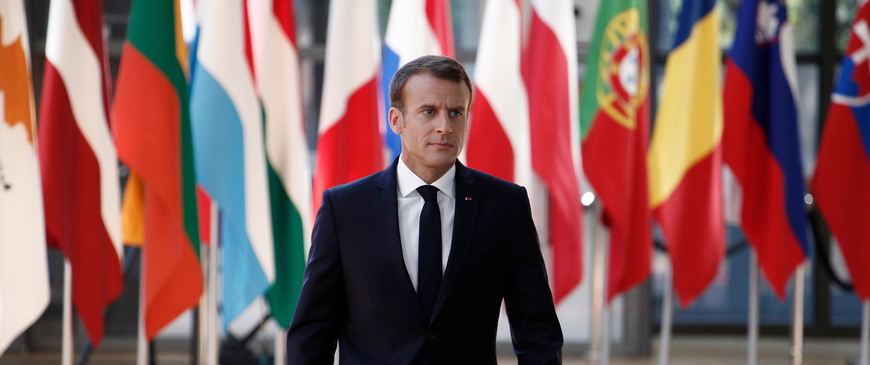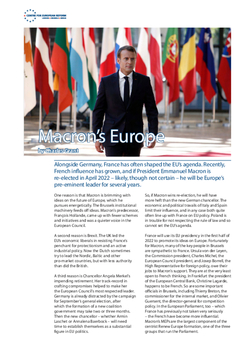
Macron's Europe
Alongside Germany, France has often shaped the EU’s agenda. Recently, French influence has grown, and if President Emmanuel Macron is re-elected in April 2022 – likely, though not certain – he will be Europe’s pre-eminent leader for several years.
One reason is that Macron is brimming with ideas on the future of Europe, which he pursues energetically. The Brussels institutional machinery feeds off ideas. Macron’s predecessor, François Hollande, came up with fewer schemes and initiatives and was a quieter voice in the European Council.
A second reason is Brexit. The UK led the EU’s economic liberals in resisting France’s penchant for protectionism and an active industrial policy. Now the Dutch sometimes try to lead the Nordic, Baltic and other pro-market countries, but with less authority than did the British.
A third reason is Chancellor Angela Merkel’s impending retirement. Her track-record in crafting compromises helped to make her the European Council’s most respected leader. Germany is already distracted by the campaign for September’s general election, after which the formation of a new coalition government may take two or three months. Then the new chancellor – whether Armin Laschet or Annalena Baerbock – will need time to establish themselves as a substantial figure in EU politics.
So, if Macron wins re-election, he will have more heft than the new German chancellor. The economic and political travails of Italy and Spain limit their influence, and in any case both quite often line up with France on EU policy. Poland is in trouble for not respecting the rule of law and so cannot set the EU’s agenda.
France will use its EU presidency in the first half of 2022 to promote its ideas on Europe. Fortunately for Macron, many of the key people in Brussels are sympathetic to France. Ursula von der Leyen, the Commission president, Charles Michel, the European Council president, and Josep Borrell, the High Representative for foreign policy, owe their jobs to Macron’s support. They are at the very least open to French thinking. In Frankfurt the president of the European Central Bank, Christine Lagarde, happens to be French. So are some important officials in Brussels, including Thierry Breton, the commissioner for the internal market, and Olivier Guersent, the director-general for competition policy. In the European Parliament, too – which France has previously not taken very seriously – the French have become more influential. Macron’s MEPs are the largest component of the centrist Renew Europe formation, one of the three groups that run the Parliament.
France will use its EU presidency in the first half of 2022 to promote its ideas on Europe. Fortunately for Macron, many of the key people in Brussels are sympathetic to France.
Those inside the French government argue – with some justice – that it is not their machinations and string-pulling that ensure French influence, but rather the fact that the world is changing. COVID-19 and the new emphasis on the need for resilient supply chains have made more people sympathetic to Macron’s idea of ‘strategic autonomy’. Broadly defined, the term means that Europe develops not only the capacity to pursue its own interests in defence and security, but also safeguards its independence in areas like energy, trade, financial services and critical technologies.
The French are happy that the Commission is increasingly willing to stand up to China on economic issues. Thus the Commission has produced a policy paper on the need for the EU to gain better access to supplies of rare earths (currently dominated by China). It has proposed legislation that could exclude foreign firms (for example, from China) that receive distortive subsidies from taking part in European public procurement or from acquiring European firms. The EU’s foreign investment screening regulation has been in operation since October 2020. The Commission has become more supportive of industrial policy, for example by encouraging Franco-German efforts to foster an electric-vehicle battery industry. And its trade policy now places greater emphasis on reciprocity and the ability to act unilaterally against unfair practices. All these steps reflect French priorities.
Some of the Nordic and Baltic countries are uncomfortable with these shifts – but many member-states go along with a lot of French ideas. German opinions are divided but some key figures such as Peter Altmaier, the economy minister, agree with the French on the need for ‘European champions’. The leaders of Germany’s Green party seem to like the idea of increasing Europe’s strategic autonomy.
In foreign policy, too, French ideas often prevail. Take the European Peace Facility, a new fund over which – because it is outside the EU budget – the European External Action Service and the member-states have more sway than the Commission. France will probably ensure that a big chunk of the money goes to its priority of the Sahel, for example to train and equip troops.
French officials say the first three months of their EU presidency must produce ‘concrete deliverables’, to help Macron to win re-election. They talk of progress on European defence, making a success of the Recovery and Resilience Facility (RRF) and starting to reform the EU’s fiscal rules. But they mention two priorities in particular. One is to show that the EU is making digital platforms behave responsibly. The French doubt they can conclude the Digital Markets Act and Digital Services Act – which they strongly support – during their presidency, but expect to make good progress on both. They expect this pair to set global standards for the regulation of Big Tech.
French officials say the first three months of their EU presidency must produce ‘concrete deliverables’, to help Macron to win re-election.
The French like Joe Biden’s plans for a minimum rate of taxation for large companies. The US is also working on an OECD-wide tax that would apply to most of the world’s largest multinationals – whether digital giants or not – and replace the unilateral taxes that several countries have imposed on the revenues of digital giants. The French worry that this could still allow some digital firms to avoid proper taxation, and have not yet decided whether to support the Commission’s own plans for an EU-wide digital levy – in addition to whatever the OECD agrees. If they do support the Commission they could annoy the US.
The second priority is to show that the EU can make a difference to climate change by implementing a carbon border adjustment mechanism (CBAM). The French know that many of Biden’s people oppose a CBAM, and that this alone will cloud the views of some European leaders, including in Germany. But the French are not deterred.
The French talk of creating a climate club that would include the OECD countries and others that adopt effective emission-reduction policies. Trade between the club’s members would avoid carbon-related charges, but goods from countries with laxer climate policies, like India, China and Russia, could face them. Apparently the OECD likes this plan, while US climate envoy John Kerry, though initially sceptical, is now willing to consider it. But French officials insist that the EU should not wait for the OECD before pressing ahead with a CBAM.
The EU will need to find about €15 billion a year to repay the debt that is funding the RRF. Both a CBAM and a digital levy are candidates to provide the EU with fresh ‘own resources’, as is the Emissions Trading Scheme. The CBAM could in theory be decided by qualified majority, as an environmental measure – but any matter concerning own resources would require unanimity.
Macron will probably have to battle both American and European opponents to get his way on the CBAM and digital taxes. But, as one former adviser notes, “his chutzpah and self-confidence are extraordinary”.
Charles Grant is director of the Centre for European Reform.

